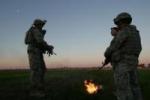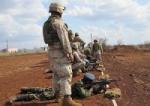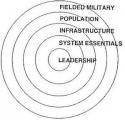ABSTRACT
Most aid spending by governments seeking to rebuild social and political order is based on an opportunity-cost theory of distracting potential recruits. The logic is that gainfully employed young men are less likely to participate in political violence, implying a positive correlation between unemployment and violence in places with active insurgencies. We test that prediction on insurgencies in Iraq and the Philippines, using survey data on unemployment and two newly- available measures of insurgency: (1) attacks against government and allied forces; and (2) violence that kills civilians. Contrary to the opportunity-cost theory, we find a robust negative correlation between unemployment and attacks against government and allied forces and no significant relationship between unemployment and the rate of insurgent attacks that kill civilians.
Eli Berman
Department of Economics, 508
University of California, San Diego
9500 Gilman Drive
La Jolla, CA 92093
and NBER
elib@ucsd.edu
Jacob N. Shapiro
Woodrow Wilson School of Public Policy
and International Affairs
Princeton University
Robertson Hall
Princeton, NJ 08544-1013
jns@princeton.edu
Joseph Felter
Hoover Institution
434 Galvez Mall
Stanford University
Stanford, CA 94305-6010
felter@hoover.stanford.edu
Introduction
The vast majority of aid money spent to reduce political violence is motivated by an opportunity-cost theory of distracting recruits. Two causal logics underlie this theory1. The most commonly cited is that gainfully employed young men are less likely toparticipate in insurgent violence2. A slightly less prominent argument is that
unemployment creates grievances, generating support for insurgent violence3. This support could lead to more violence directly—through more recruits or enhanced fundraising—or indirectly—by reducing the willingness of a population to share information with counter insurgents. Whichever causal pathway is posited, the testable implication is the same: there should be a positive correlation between unemployment and insurgent violence. We test that prediction on data from Iraq and the Philippines, using unemployment surveys and two newly- available measures of insurgency: (1)attacks against government and allied forces; and (2) violence that kills civilians.
The opportunity-cost approach is based upon a number of often implicit assumptions about the production of insurgent violence. Some of these include:
- Participation in insurgency is a full-time occupation, in the sense that individuals cannot be legitimately employed and active insurgents at the same time.
- Insurgency is a low-skill occupation so that creating jobs for the marginal unemployed reduces the pool of potential recruits.
- The supply of labor is a binding constraint on insurgent organizations.
Each of these assumptions is questionable in some contexts, suggesting first that empirical testing is warranted, and second, that the relationship between unemployment and insurgency may be more complex than is commonly assumed.
A number of alternative possible causal channels actually predict a negative correlation between unemployment and violence. Suppose, for example, that the main constraint on the production of violence is the extent to which non-combatants share information about insurgents with the government (Kalyvas, 2006; Berman, Shapiro and Felter, 2008). This might imply no
correlation between unemployment and violence, or, if counterinsurgents spend money to buy intelligence –as they routinely do, as the local employment picture worsens and household incomes drop, the marginal dollar spent to buy inforation will go further and violence will fall. Alternatively, suppose that security efforts—establishing checkpoints and the like—reduce
violence but also increase unemployment by impeding the movement of goods and services.
That would imply a negative correlation between unemployment and violence. Or, fighting a perceived occupying force might be something people do out of belief in the cause, but can do only once basic needs are accounted for. If insurgency is a normal “good” in this narrow sense, then an improved economic situation could lead to greater levels of participation and hence
greater violence so that reduced unemployment causes more violence. We survey other alternative theories below.
To empirically distinguish between theories we use panel data on local unemployment and insurgent violence in two countries: Iraq and the Philippines. These countries vary greatly both in geography and in the nature and intensity of the insurgencies they face. Yet they yield broadly
similar results.
Using a variety of statistical models we find that the data rule out a positive correlation between unemployment and violence for both the Iraqi and Philippine insurgencies; if there is an opportunity cost effect, it is not dominant in either case. Why is the correlation of unemployment and violence generally negative? Existing data do not allow us to fully adjudicate between possible reasons, but we offer preliminary evidence that it is due to the relationship between local economic conditions and counterinsurgents’ efforts to combat violence. Our findings are consistent with two hypotheses concerning counterinsurgency: (1) as local economic conditions deteriorate, government forces and their allies are able to buy more intelligence on insurgents (i.e., the price of information falls); and (2) efforts to enhance security—establishing checkpoints and the like—damage the economy.
The remainder of this paper describes our effort to study the relationship between unemployment and insurgent violence in Iraq and the Philippines. First, we briefly review the existing literature on this relationship. We then describe our data, report estimation results, and conclude.
1 United States Army Counterinsurgency Field Manual, 2006.
2 General Chiarelli, the U.S. Army Commander of Multinational Forces in Iraq, made this
argument in a press briefing, December 8, 2006.
3 See, for example, Brainard and Chollet, 2007, p. 3.
.





 .
. !
!

 "A Sherman can give you a very nice... edge."- Oddball,
"A Sherman can give you a very nice... edge."- Oddball, 






Bookmarks